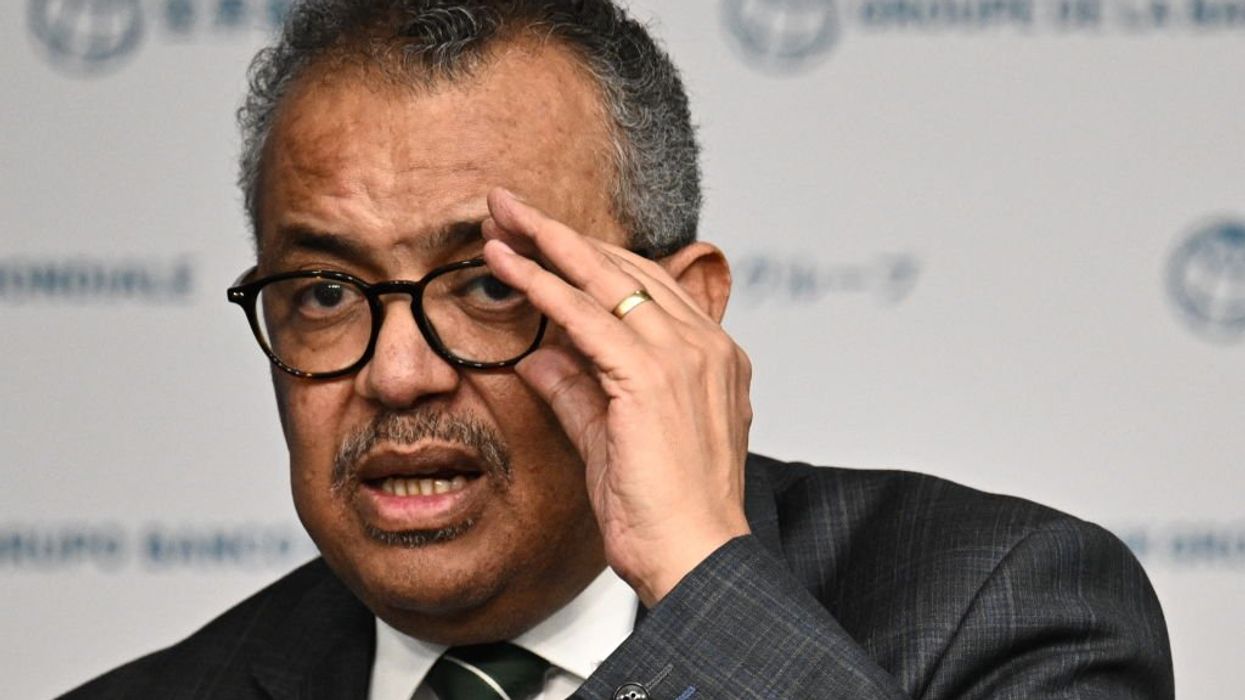
Photo by MANDEL NGAN/AFP via Getty Images

A lack of consensus won't stop the WHO from trying again to further extend its tentacles.
WHO director-general Tedros Adhanom Ghebreyesus and other globalists were met with failure at the May 27-June 1 World Health Assembly in Geneva, Switzerland. Rather than win over critics with reassurances ahead of the next stage of his campaign to promote the failed scheme, Ghebreyesus instead doubled down, urging a crackdown on skeptics.
Ghebreyesus has spent several months promoting his "global pandemic agreement."
In his Feb. 12 Dubai address, entitled, "A Pact with the Future: Why the Pandemic Agreement Is Mission-Critical for Humanity," Ghebreyesus said, "We cannot allow this historic agreement, this milestone in global health, to be sabotaged by those who spread lies, either deliberately or unknowingly."
The critics whom Ghebreyesus branded liars and conspiracy theorists include those who reckon the pact would undermine national sovereignty as well as those skeptical of the WHO's competence. In the latter case, the WHO did itself no favors in recent years, particularly during the pandemic.
After all, the organization reportedly aided the Chinese communist regime in its cover up of COVID-19's origins; told the nations of the world not to restrict travelers from China or close their borders even though China had domestically; granted Beijing a veto over the WHO's COVID-19 origins report; and it endorsed vaccines that were not nearly as safe or as effective as advertised, including the blood clot-inducing Oxford-AstraZeneca COVID-19 vaccine whose developer now faces a class-action lawsuit over injuries in the United Kingdom as well as a recent lawsuit in Utah. Prior to the pandemic, it also courted controversy with its sexual abuse scandal, wasteful spending, and corruption.
Evidently, it was not enough for the WHO director to demean opponents of his grand scheme to see it through.
'I know that there remains among you a common will to get this done.'
"Of course, we all wish that we had been able to reach a consensus on the agreement in time for this health assembly, and cross the finish line," Ghebreyesus said in his opening remarks at the 77th World Health Assembly. "I remain confident that you still will, because where there is a will, there is a way. I know that there remains among you a common will to get this done."
In the days that followed, the assembly failed to cross the finish line or even come close. As the result, Ghebreyesus has sought to transform the race into a marathon.
Desperate to keep the dream alive after two years of futile negotiations, the WHO had countries agree to continue negotiating the proposed globalist pact. A package of half-measures have apparently been accepted to tide over pandemic treaty supporters in the meantime.
The WHO said in a statement Saturday that the World Health Assembly and its 194 member countries "agreed [on] a package of critical amendments to the International Health Regulations (2005) (IHR), and made concrete commitments to completing negotiations on a global pandemic agreement within a year, at the latest."
The half-measures compromise amendments to the IHR that will supposedly "strengthen global preparedness, surveillance and responses to public health emergencies, including pandemics."
These include a new definition for "pandemic emergency"; another "equity"-driven international wealth re-distribution mechanism; the creation of a new bureaucracy to oversee the implementation of the other half-measures; and the creation of IHR authorities for member countries to "improve coordination of implementation of the Regulations within and among countries."
"The amendments to the International Health Regulations will bolster countries' ability to detect and respond to future outbreaks and pandemics by strengthening their own national capacities, and coordination between fellow States, on disease surveillance, information sharing and response," said Ghebreyesus. "This is built on commitment to equity, an understanding that health threats do not recognize national borders, and that preparedness is a collective endeavor."
After negotiators failed to produce a draft deal for approval by the WHO annual assembly, Ghebreyesus gave a speech promoting health initiatives and vaccines.
'I think they use COVID as an opportunity and, you know, all the havoc they're creating.'
Toward the end of his remarks, he noted, "You know, the serious challenge that's posed by anti-vaxxers and I think we need to strategize to really push back because vaccines work, vaccines affect adults, and we have science, evidence on our side."
"I think it's time to be more aggressive in pushing back on anti-vaxxers," continued the WHO director. "I think they use COVID as an opportunity and, you know, all the havoc they're creating. Maybe that's one of the messages I'd also like to include to whatever I have [to] say."
Like Blaze News? Bypass the censors, sign up for our newsletters, and get stories like this direct to your inbox. Sign up here!